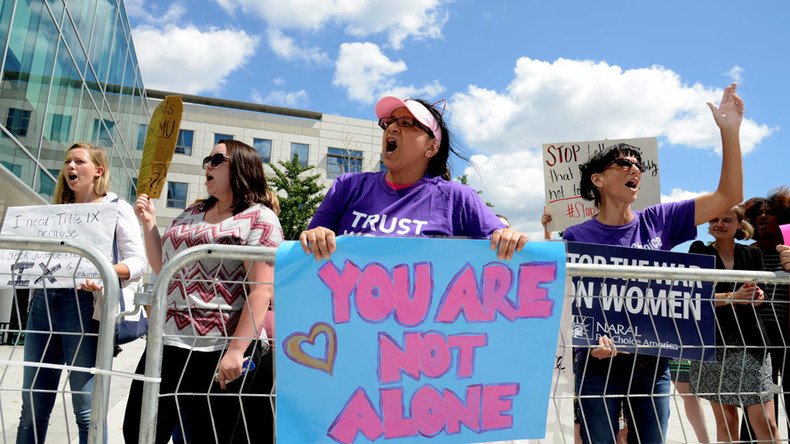New DOE guidelines give colleges choice how investigate sexual assault

The US Department of Education is replacing the Obama-era guidance on investigating campus sexual assault with interim instructions that allow universities to decide which standard of evidence to use when handling complaints.
Education Secretary Betsy DeVos has said repeatedly the Obama-era rules denied due process rights to students accused of sexual assault.
READ MORE: DeVos to revise campus sexual assault rule
“This interim guidance will help schools as they work to combat sexual misconduct and will treat all students fairly,” DeVos said in a statement on Friday. “Schools must continue to confront these horrific crimes and behaviors head-on. There will be no more sweeping them under the rug. But the process must be fair and impartial, giving everyone more confidence in its outcomes.”
JUST IN: DeVos rescinds Obama rules combating campus sexual assault https://t.co/GN8WgRoDiGpic.twitter.com/Hxd6qAyXPL
— The Hill (@thehill) September 22, 2017
The temporary guidance allows colleges the freedom to decide which standards of evidence they want to use when investigating complaints of sexual assault.
Under the instructions by the Obama administration from 2011 and 2014, colleges were told to use the “preponderance of evidence” standard to decide whether a sexual assault occurred, a less rigorous evidentiary standard than the “beyond a reasonable doubt" that applies in most criminal cases.
Those rules were drawn up after advocates for victims and women spent the previous six years waging a campaign to combat what some have called a ‘rape culture’ on campus.
A 2015 survey commissioned by the Association of American Universities found that more than one in four women at a large group of leading universities said they had been sexually assaulted by force or when they were incapacitated, while in college.
Education Department formally rescinds Obama-era campus sexual assault guidance https://t.co/OEDiT0JrB9pic.twitter.com/A8LqgKXhBe
— CNN (@CNN) September 22, 2017
Candice Jackson, the top civil rights official at the DOE, told the New York Times in July that her office received hundreds of letters from college students, mostly men, who had been accused of rape or sexual assault. Some had lost scholarships, some had been expelled, and some have even tried to commit suicide, Jackson said, referencing a letter from one student’s mother.
“Listening to her talk about walking in and finding him in the middle of trying to kill himself because his life and his future were gone, and he was forever branded a rapist — that’s haunting,” Jackson told the Times, describing a meeting with the mother of a young man who had been accused of rape three months after his first sexual encounter.
DeVos has cited a task force of the American Bar Association and another by the American College of Trial Lawyers, both of which managed to find consensus on how to make the current system more fairer to accused students, according to NPR.
Among their suggestions is that the student should have attorneys who can actually speak during the hearings. Students should see all evidence being considered and both sides should be able to do some cross-examination through written questions.
The task force recommended against the so-call investigator model, in which an investigator is also the person rendering judgement.
DeVos has also proposed getting campuses out of the business of adjudicating cases of sexual assault, and outsource the job to experts. The idea is to set up regional centers where professionally trained specialists would investigate and adjudicate allegations.
Friday’s temporary guidance will be in effect until the permanent guidelines can be worked out the Department of Education said.
"In the coming months, hearing from survivors, campus administrators, parents, students and experts on sexual misconduct will be vital as we work to create a thoughtful rule that will benefit students for years to come. We also will continue to work with schools and community leaders to better address preventing sexual misconduct through education and early intervention," DeVos added.














